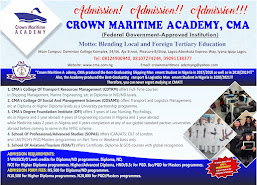Maritime Experts Laud NIMASA’s Drive Toward CVFF Disbursement
Kathy Kyari
Maritime experts have commended the Nigerian Maritime Administration and Safety Agency (NIMASA) for its ongoing efforts toward the full implementation of the Cabotage Vessel Financing Fund (CVFF) disbursement.
The commendation was made during a panel session at the 2025 Maritime Law Seminar organized by the Nigeria Maritime Law Association (NMLA) in Lagos.
The event, themed "Lens into the Future of the Shipping Industry," brought together key industry stakeholders to explore developments in maritime law and policy.
Speaking during a session titled "Renewed Prospects for the Full Implementation of the Cabotage Act," maritime lawyer Adedoyin Afun praised NIMASA for seeking innovative ways to leverage the CVFF for improved financial guarantees in ship financing.
He explained that shipbuilding typically involves emission guarantees, which help ensure the fulfillment of payment obligations for newly built vessels.
“NIMASA is exploring partnerships with multilateral agencies to facilitate ship finance credit, seller’s credit, and improved shipbuilding,” Afun stated.
“Shipyards can build for Nigeria with NIMASA providing guarantees. The funds remain untouched unless there is a payment default,” he added.
According to Afun, such arrangements align with the cabotage framework, encompassing loans, debt instruments, and guarantee-based funding models. He emphasized that the guarantee element could attract third-party investors and funding, enabling the growth of maritime capacity.
Also speaking at the event, the Executive Director of Cabotage and Maritime Labour at NIMASA, Jibril Abba, described the CVFF as a transformative tool for empowering local shipowners.
Represented by Deputy Director (Legal), Abdulmumuni Dirisu, Abba stressed that the loan disbursement process would be closely monitored to ensure transparency and effective utilization.
He reminded participants that the CVFF, established under the 2003 Cabotage Act, is aimed at supporting vessel acquisition and boosting capacity among Nigerian maritime operators.
“After almost two decades, CVFF’s disbursement marks a new era with eligibility criteria and collaboration with 12 Primary Lending Institutions,” he said.
“CVFF is a loan, not a grant,” he added, urging prospective beneficiaries to apply through designated banks and adhere to the established process.
Abba also acknowledged the NMLA for including NIMASA in the dialogue, stating that such stakeholder engagements help refine the agency’s implementation strategies.
In his remarks, President of the African Ship Owners Association, Captain Ladi Olubowale, underscored the urgent need for Nigeria to invest in strategic and service vessels, particularly for coastal trade.
“Dangote now uses Angola’s fleet. When will Nigeria have her own vessels flagged and ready for trade?” he asked.
“There are ships for sale, suitable for our use. We can get ones aged under five years, with 10 years’ service potential,” he said.
Olubowale warned that Nigeria’s continued reliance on foreign-flagged ships and waivers to discharge cargo in its waters undermines the nation's cabotage goals. He added that with only five countries currently building ships globally, Nigeria may need up to 25 years to build full shipbuilding capacity.
Also lending his voice, former Executive Secretary of the Nigerian Shippers’ Council, Hassan Bello, drew parallels between the successful enforcement of cabotage in aviation and the maritime sector.
He called on NIMASA to issue clear directives to support domestic trade within Nigeria’s territorial waters and advocated for the development of a strategic fleet to bolster the country’s participation in international trade.
Bello further emphasized the importance of broad stakeholder involvement in NIMASA’s planning and implementation efforts, noting that such collaboration is key to advancing Nigeria’s maritime agenda.


















0 Comments